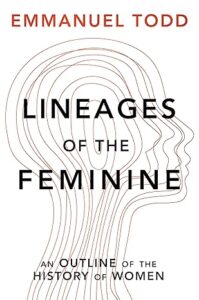Battle of the Sexes
By Arnold Kling


- Societies that have finished moulding themselves according to the patrilineal principle have indeed experienced a long and slow tragic cycle. After having invented everything—writing, the state… the first economic globalization, in the Bronze Age—they got bogged down. This great inertia, which we then see in China and India, and in Africa… is one of the great mysteries of history…. My own explanation is that it resulted from the lowering of the status of women.
- —Emmanuel Todd, Lineages of the Feminine: An Outline of the History of Women,1. p. 104
I can react to the book, but I cannot truly review it. The topics range too widely, and Todd’s anthropological terminology is too confusing to me (perhaps this is confounded by the fact that I am reading Lineages in translation).
In examining sex roles, anthropologists have often classified ancient societies by looking at family patterns. What sorts of marriages are encouraged or forbidden? Does the newly married couple live closer to the husband’s family or the wife’s family? Who inherits property when parents die? Todd uses these sorts of questions to infer the status of women historically.
From a modern perspective, two questions stand out in my mind:
- 1. To what extent are certain high-status occupations predominantly male or female?
- 2. To what extent are social customs and laws designed to restrict the sexual conduct of one sex or the other?
I take away from Lineages three phases illustrating how the Western world has answered these questions. The first phase, from roughly 1500 to 1950, was a patriarchy. The second phase, from roughly 1950 to 2000, was women’s liberation. The third phase, still ongoing, Todd sees as headed toward matriarchy.
Under the patriarchy, high-status occupations were predominantly male. In the United States, women were rarely found in leadership positions in business, politics, or the judiciary. In writing for newspapers, they were often confined to the fashion or society pages. In higher education, they were mostly confined to service-oriented fields at second-tier institutions.
Also under the patriarchy, women’s sexual freedom was restricted. Premarital and extramarital sex were taboo. Abortion was illegal. Female sexual desire was ignored or denied.
Of course, under this regime men’s sexuality was also repressed. But the legal and religious codes were written and enforced by men, without female input.
Evolutionary psychology provides an explanation for how patriarchy would arise. Joyce Benenson’s Warriors and Worriers, for example, says that prehistoric males learned to organize and cooperate though fighting, which would have made them temperamentally suited to forming and leading corporations and government institutions.
Todd seems unfamiliar with evolutionary psychology. But as an anthropologist, concerning males’ role in hunting in ancient cultures, he writes,
- This is the most extraordinary map of the distribution of a social trait that I have ever contemplated in my life: there is no variation. It is the men who hunt…. The level of homogeneity for hunting is staggering. p. 118-119
Todd argues that the sexual division of labor in prehistoric societies is undeniable. But he also sees it as anachronistic. The economy has progressed far beyond hunting and gathering, as it moved to agriculture, then to manufacturing, and now increasingly to services.
Evolutionary psychologists predict that men will want to control the sexual behavior of women, in order to assure paternity. A man does not want to risk providing resources to a woman to support another man’s child.
Again, Todd ignores this theory. He sees sexual repression as an anachronism. He links the shift toward sexual freedom since 1950 to the advent of better birth control, notably the pill, and to Christianity’s rapid decline.
By the 1960s, the patriarchy is giving way to women’s liberation. Under women’s liberation, male-dominated occupations are opened to women. Premarital sex becomes tolerated. Extramarital sex and divorce lose some of their stigma. Women’s sexual desire is acknowledged.
Over the last two decades, Todd sees a new phase in the cultural evolution of sex roles. Now, any high-status occupation that is still male-dominated is suspected of suffering from unwarranted discrimination against women. The expectation is that such bastions must fall. But no questions or doubts are raised as women become dominant in other high-status fields and obtain an ever-larger majority of college degrees.
Sexual norms, as embodied in the #MeToo movement, for example, give women the power to dictate sexual conduct to men. Today, it is men’s sexuality that is repressed by women. Todd refers to the 21st-century trend as “antagonistic feminism” or the onset of matriarchy.
For the record, my preference would be for all occupations to be open to women, but if a particular organization or niche becomes mostly male, that should not require a change. My preference would be for sexual restraint to be encouraged for both sexes, but not insisted upon. And a male who makes an awkward pass should not be punished with ostracism.
Lineages is filled with Todd’s observations, some of which he supports with statistics and others which he does not support at all. The rest of this essay will offer a sample of these. Note that I disagree with many of them.
Todd is scornful of contemporary uses of the terms patriarchy and gender:
- I would be tempted to say that the real reason for the choice of the word ‘gender’ rather than sex… is a latent form of puritanism. With gender, it’s not so much that we are introducing the social; rather, we are repressing the image of the genitalia. p. 41
Todd speculates that men are naturally more communitarian than women:
- deep down in human history… men specialized in the collective of the local group and women specialized in the individuality of the family. p. 130
He speculates that Christianity in the Middle Ages was protective of women:
- Gestation and childbirth… have certainly killed many more women in human history than war or car accidents have killed men…
- … we can understand why many women adhere to the Christian rejection of sexuality. p. 136
Concerning the social effects of the birth control pill, he writes:
- … it makes procreation a female decision. The loss of male power is total here… it is now the woman who decides whether or not to have a child. p. 146
On the trend toward more women completing college:
- [In France as of 2018] Among those aged 35-44, 38.6% of women but only 24.7% of men have had higher education. Among the 25-34-year-olds, it’s 36.1% of women and 29.6% of men… The student population is predominantly female. p. 149
On the paradox of female progress:
- … we are seeking to explain the rise of an antagonistic vision of relations between the sexes, even though so many objective indices reveal a massive improvement in the situation of women… they have arrived en masse on the labour market, including in positions of responsibility…. Could it be that the rise of a negative vision of the male sex is partly a result of this new freedom for women, generating a soft anomie, a new kind of dissatisfaction, as much as it produces freedom? p. 163-164
Against this, he notes a sense in which the sexual division of labor has not changed.
- In Sweden… 93% of nurses, 87% of those who take care of the elderly, 84% of social workers, 83% of assistants or secretaries and 82% of those working with children are women. Finally, 80% of kindergarten teachers are female. Conversely, masons, carpenters, and electricians are 98% male. Among metalworkers and mechanics, the proportion of men is always above 95%.
- The massive entry of women into employment therefore most often conceals a strong and almost complete resistance on the part of the sexual division of labor. Women specialize in trades which seem to be the salaried counterparts of their tertiary functions in the family of hunger-gatherers…. p. 166-167
Todd uses his picture of women as individualistic to throw this wild punch:
- Between 1980 and 2020, the Western world was submerged by a neoliberal ideology and a set of policies that stubbornly persist despite their obvious failure. The standard of living is falling, free trade has destroyed our factories… But there has been no massive, industrialist and protectionist collective reaction… ask ourselves if the feminist revolution is not also contributing to our inability to act collectively. p. 175-176
On the impact of women on academic research:
- When I joined INED [The Institute for Demographic Studies] in 1984, it was a world of men, dominated by polytechniciens implementing an elegant mathematical approach to population issues…
- The institute is now 61.4% female as far as researchers are concerned, with a peak of 91.7% among 20-29-year-olds….
- The reversal of the sex ratio was accompanied by a change in research orientations at INED. The mathematical heart has atrophied. Its psychological-sociological periphery has welled in proportion, obviously including an interest in ‘gender’. p. 192
For more on these topics, see
- “Persistent Differences in Gender Temperament,” by Arnold Kling. Econlib, Feb. 6, 2023.
- “The Boys Under the Bus,” by Arnold Kling. Econlib, Dec. 5, 2022.
 Alison Wolf on Women, Inequality and the XX Factor. EconTalk.
Alison Wolf on Women, Inequality and the XX Factor. EconTalk.
On the disconnect between the feminism of the upper middle class and the needs of society at large:
- In the working classes, where couples’ relations are already destabilized by unemployment and a remnant of hypergamic aspiration, the antagonistic model is disastrous in its psychological effects. The world of single-parent families does not need more confrontation between the two sexes, but more trust. p. 195
On female dominance in the judicial system in France:
- … in 2017, 66% of judges were women, a proportion that rose to 84% among judges aged 30-34. p. 211
On trends against freedom of expression:
- … we have passed, in the West, into a matridominated ideological system. However, we are immersed in an ever-expanding world of mental and verbal prohibitions… not to examine the possibility of a connection between the two phenomena would be sociologically negligent. p. 212
On sexual preference becoming an identity:
- The Christian West has been negatively obsessed with sex for two millennia. But if we turn sexual orientation into the central element of personal identity, isn’t that still maintaining an obsession with sexuality? p. 240-241
Podcast followup: From the Shelf with Curator Arnold Kling:
- Rebecca Burgess and Michael Lucchese discuss the book Lineages of the Feminine: An Outline of the History of Women, by Emmanuel Todd. YouTube, 10/24/2023.
Again, I include these quotations to give the flavor of the book, not to indicate agreement. What I took away from Lineages was narrower and may differ from what the author intended.
*Arnold Kling has a Ph.D. in economics from the Massachusetts Institute of Technology. He is the author of several books, including Crisis of Abundance: Rethinking How We Pay for Health Care; Invisible Wealth: The Hidden Story of How Markets Work; Unchecked and Unbalanced: How the Discrepancy Between Knowledge and Power Caused the Financial Crisis and Threatens Democracy; and Specialization and Trade: A Re-introduction to Economics. He contributed to EconLog from January 2003 through August 2012.
Read more of what Arnold Kling’s been reading. For more book reviews and articles by Arnold Kling, see the Archive.
